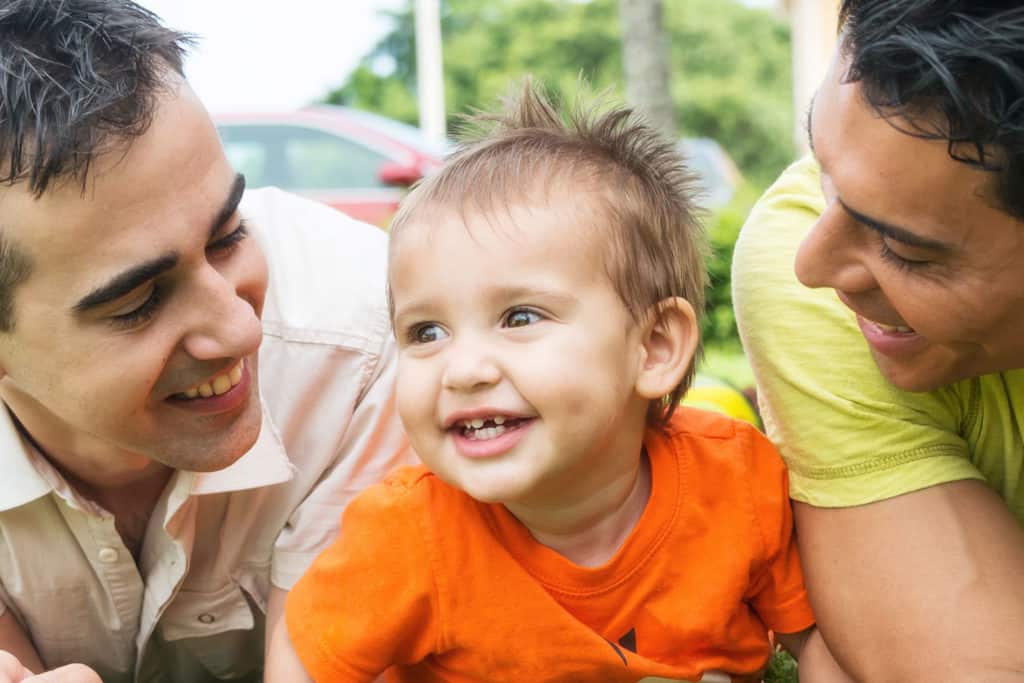All adoptive families will likely have conversations about the validity of their family, and how to deal with prejudice and questions from people outside the family. LGBTQ parents also have the added complexity that cross-gender parenting can bring. The counseling team at Spence-Chapin offers practical advice and support for LGBTQ parents raising adopted children.
These 10 tips offer support and guidance around the particular issues that LGBTQ adoptive parents navigate with their children.
1. USE TIME BEFORE ADOPTION TO PLAN AND ASK QUESTIONS
If you are just embarking on your adoption journey, or are in process, now is the time to really do your homework and ask the hard questions about what you and your partner (if co-parenting) want and what feels right in family forming for you. If working through an adoption agency, take advantage of their experience to ask many questions, or see if you can speak with other families that could provide you with insight. The more questions you answer early, the more informed and comfortable you will become.
2. BE COMFORTABLE WITH YOUR SEXUAL IDENTITY
The more comfortable you are with your sexual identity and the coming out process, the easier parenting will be for you. When you are comfortable expressing yourself, it models emotional expression for your children. The less issues we work out on our children the easier parenting them will be. If you or your partner struggle in certain ways with your sexual identity, consider seeking out a counselor who can help you sort through those issues before you embark on parenting. Being confident and comfortable in your identity will help your family model that attitude and behavior to also be confident and comfortable.
3. ENCOURAGE DIALOGUE
Whether your family was formed through adoption or not, honesty and openness are always the best policy. Your family may look different to the outside world, but to your children this is their family. This is what they are accustomed to and this is what makes sense to them. Start as young as possible reading affirming books to toddlers. If issues should arise from the outside world or they have questions due to their different developmental stages, let them know you are always open to them. This requires having on-going continuing conversations as needed throughout childhood and young adulthood. Open dialogue can be uncomfortable at first but gets easier as everyone shares their thoughts and feelings.
4. STAY INVOLVED WITH YOUR CHILDREN’S SCHOOL
Get to know their teachers. This sense of openness within the community and where your children spend so much time is important. Just by being present, you show that you are advocating for your family and your expectations for your children’s wellbeing.
5. CREATE AN LGBTQ NETWORK
This can be invaluable. You do not have to reinvent the wheel. Others have done this before you. Just as an LGBTQ person you might have formed your own family outside of your birth family for certain types of support, this skill can be a great comfort to your family. Your children can see other children and families that look like their own. For children who are adopted this can be equally impactful to interact with other children who are adopted to help them form and express their own adoptive identities. It gives your children a chance to talk to other children about their experiences in the community. Whenever we feel we are not alone it is an ego booster!!
6. CREATE YOUR OWN FAMILY PRIDE
Your family is as important as any other. The more comfortable you are showing your pride, the easier it will be for your children.
7. SHOW AND EXPRESS YOUR LOVE
Do not be afraid to show and express your love. Children need unconditional love, to feel supported, to have their emotional and physical needs met. Your children will benefit from as much quality time as you can spend with them.
8. BE A POSITIVE ROLE MODEL FOR YOUR FAMILY
Your children will learn from you how to advocate when they need to. Providing a safe environment at times might mean saying something at their school, to family members or friend’s parents. This does not mean being a bulldozer, but modeling self-respect, awareness , sensitivity, and education when possible. Remember all parents teach by positive modeling. This will help create a safe and supportive environment for your children.
9. HAVE ON-GOING CONVERSATIONS
Have on-going conversations with your children about their friends and their relationships with their peers. Friends are important, no matter the parents’ sexuality. Kids need to be connected and not made to feel that they’re different. Start involving them in activities with other children and their parents at an early age. This way, you are building support and recognition for you and your child outside of the immediate family unit.
10. TAKE TIME FOR YOUR RELATIONSHIP
If you are in a partnered relationship don’t forget to make time to have a date night, special time together, or something you both enjoyed doing together before children. Like any other couple you will need to find ways and times to reconnect with each other. Parenting is stressful for everyone! Taking the time to reconnect and relax will help make your journey even more enjoyable.
Spence-Chapin provides a safe and family-friendly environment for you and your family. We offer culturally sensitive, LGBTQ-affirming care in an accepting, nonjudgmental environment. Services include pre-adoption consultations, counseling, parent coaching, community events, LGBTQ parent workshops and trainings for LGBTQ professionals. Learn more about our post-adoption support and community programs.
Contact us at [email protected] or 646-539-2167 to explore ways our team can support your family.






